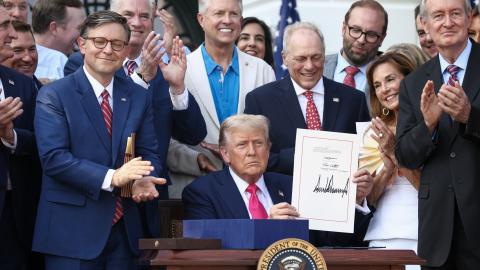
Republican lawmakers are flaunting to their constituents about the recently passed "big, beautiful bill," framing it as a success for working class families. However, a new poll suggests that voters are not buying into that idea, as the majority of U.S. adults think the new tax bill will benefit the wealthy and harm those in lower classes.
That conclusion comes from a recently published Associated Press-NORC Center for Public Affairs Research poll. The survey was conducted between 1,437 American adults between July 10-14 using a sample drawn from NORC's probability based AmeriSpeak panel. The margin of sampling error is plus or minus 3.6 percentage points.
According to the new survey, about two-thirds of U.S. adults expect the new tax law will help the rich. Similarly, 6 in 10 Americans think it will do more to hurt than help low-income people. About half say it will do more harm than good for middle-class people and people like them.
But despite the majority of adults thinking that the new law will primarily help the wealthy, there is still a partisan divide evident in this ideology. More specifically, Democrats and independents are much likelier than Republicans to think the law could harm them personally.
About half of Republicans expect the legislation to do more to help "people like you," compared with about 2 in 10 independents and just 6% of Democrats.
The "big, beautiful bill's" price tag has also led more adults to disapprove of the way the Trump administration is handling government spending since the spring. In fact, just 38% of Americans approve of how Donald Trump is handling government spending, compared with 46% who thought the same in March.
At the center of the controversial bill is an extension of Trump's 2017 Tax Cuts and Jobs Act, which was slated to end this year. The legislation makes most of the tax cuts permanent, while increasing spending for border security, defense and energy production, CBS News reports.
The bill is partially paid for by significant cuts to health care and nutrition programs, like Medicaid and the Supplemental Nutrition Assistance Program, or SNAP. The Congressional Budget Office estimates the bill would add $3.4 trillion to federal deficits over the next 10 years and leave millions without health insurance. Nevertheless, Republicans and the White House dispute those predictions.
Since the bill was signed into law by the president, Republicans have tried to frame it as a win for working class families, saying they've delivered broad tax cuts, an unprecedented investment in immigration enforcement and new restraints on social safety net programs. On the other hand, Democrats have painted it as a law that rolls back health insurance access and raises costs for middle-class Americans while cutting taxes for the rich, curtailing green energy initiatives and restricting some workers' organizing rights.
"It represents the broken promise they made to the American people," said Rep. Suzan DelBene, a Washington Democrat who chairs the party's House campaign arm. "We're going to continue to hold Republicans accountable for this vote."
© 2025 Latin Times. All rights reserved. Do not reproduce without permission.




